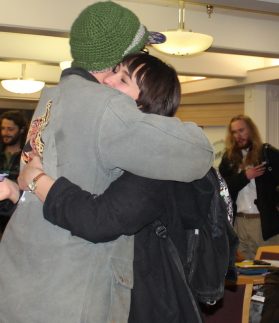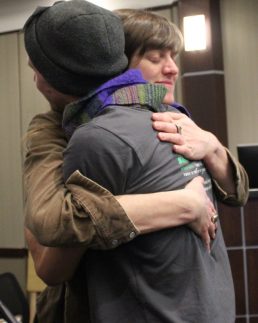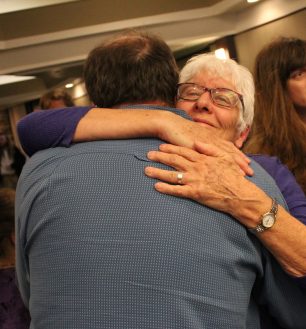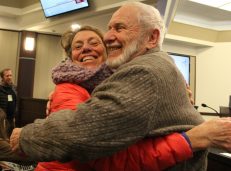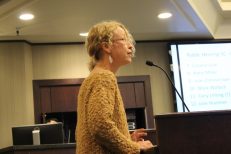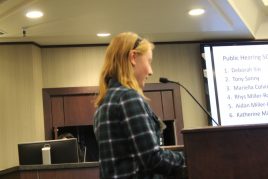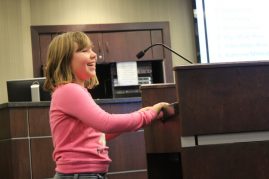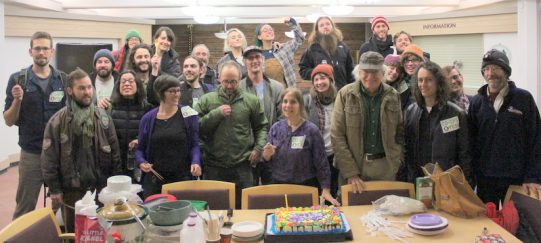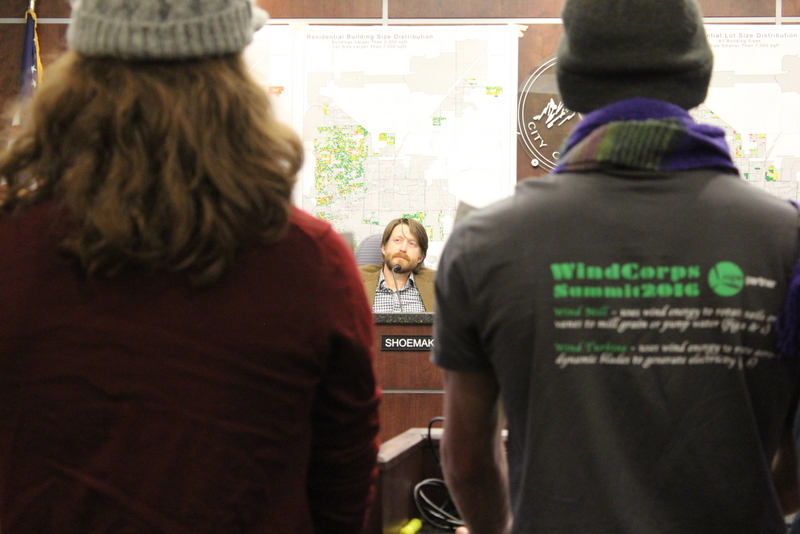 Cedar Barstow was integral to the first draft for cooperative housing ordinances in Boulder 23 years ago. She has been cooperative living since the 1980’s in Boulder. In 1994 her household became an illegal coop because of a new ordinance limiting the number of unrelated persons living in a home to three. Despite no complaints from neighbors, she was forced to say goodbye to housemates who had become more like family.
Cedar Barstow was integral to the first draft for cooperative housing ordinances in Boulder 23 years ago. She has been cooperative living since the 1980’s in Boulder. In 1994 her household became an illegal coop because of a new ordinance limiting the number of unrelated persons living in a home to three. Despite no complaints from neighbors, she was forced to say goodbye to housemates who had become more like family.
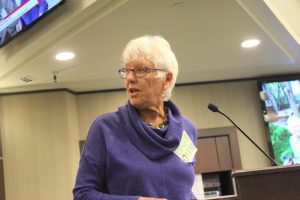
Cedar Barstow who started her first housing coop in the mid 80’s turns to the audience to ask supporters to stand. Most people in the room stood in support of coop housing.
The family feel of the co-op was so profound in her home that over a dozen former housemates from all over the country returned to Barstow’s home in 2015 for a 30th anniversary party of the first year she opened her home and became a co-op. That day in the community space of her home, each told the story of how they were led to her home. Some were changing jobs, one was going through a relationship break-up. All remembered their time with Barstow fondly.
This same sentiment was shared by many of the 91 who signed up to speak at Tuesday’s Boulder city council meeting. The majority of a full council chambers were wearing giant stickers that read, “Co-ops yes!” Some said that they had finally found a family and a home, others said that they are living environmentally consciously while sharing heat, light, and travel. Some living in co-ops said that they use 75% less electricity over those living alone in Boulder and that this reduction of energy usage was in line with the city’s climate goals.
Blake Marcelle who uses the pronoun “they,”approached the podium saying that they were neither a “she” nor a “he,” and invited those whom they identified from their co-op to stand behind the podium also so that council could see the collective one more time, “Because I think they are really amazing and they’re the only people who I know who say the same ‘Blake’ that is my name, and who hear my voice and see my face and don’t try to decide that I’m a boy or a girl or don’t exist.”
Earlier in Marcelle’s testimony they said that at a time when they came out of multiple closets, they lost their biological family and that the co-op members became family, “Part of the reason much of this ordinance is frustrating to me is that the way that I love and choose relationships have been legislated and ‘mislegislated’ for so long. My family doesn’t look like the families of most of the NIMBY [Not In My Back Yard] folks who don’t want my co-op around. And that doesn’t mean it’s not just as valid as their family. My family is bigger. My family does not share my blood. And that’s my family.”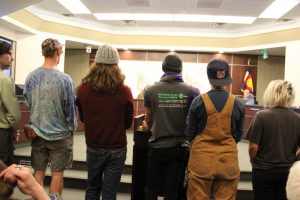
Marcelle compared the needs of those who can’t afford Boulder’s rent that outweigh the needs of the opposition who are concerned with a drop in property values and encouraged council to do triage, “Let’s talk about when someone is saying ‘I’m at risk of losing a limb, listen to me,’ versus when someone says ‘I’m at risk of getting a paper cut, listen to me.’ Who needs to be listened to more?”
Luca Sisca’s words were a little stronger referring to city council’s earlier vote to move Boulder to sanctuary status to protect immigrant communities, “We don’t get to be a sanctuary city and then not help our neighbors out to exist and survive and contribute to this community. I’m a teacher in Boulder County and I don’t get to live here unless this ordinance is passed with the very well researched and graphed out numbers that my community has provided for you. I chose this family and it needs to be respected in the way that any other family would be.”
Sisca referred to a report presented by Boulder Housing Coalition that compared impacts of housing co-ops for some of the contingencies being considered by city council as compromises to maybe satisfy those (represented by about 20% of those who spoke at this meeting) who were opposed to co-ops.
One speaker criticized that presentation saying, “That’s like taking a report from Exxon about the effects of the oil industry on the climate,” but peer reviewed studies presented by Shae Frydenlund, a PhD geography student at the University of Colorado, Boulder and co-founder of the Affordable Housing Research Initiative (BARI) supported data in favor of co-ops. Research conducted at CU includes a long-term project on affordable housing in Boulder county.
“I want to preface my statement by rejecting unsubstantiated claims about cooperative housing. We have found no research data in any peer reviewed article or journal source that identifies a correlation between coops and decreased property values. Studies from MIT center for real Estate, the University of Wisconsin, Madison, and Harvard University all reject claims that high density dwellings, medium density homes reduced property values and in many instances they increase property values. Since the fall of 2015, BARI researchers have conducted 50 interviews and analyzed 110 survey responses and engaged in participant observation as well as facilitated focus groups at a community outreach event with a wide array of Boulder residents living in affordable, subsidized cooperative, and market rate housing.
Most recently the team collected data from surveys, interviews, and collective mapping events with residents of cooperative housing. This data revealed that cooperative residents are considerably poorer than the average Boulder County residents. They are more likely to be a person of color, bilingual, identify as gay, transgender and queer and are more likely to earn less than Boulder’s Average Median Income [AMI] which is $85,400. The average income of cooperative residents is below $21,000. 87% of respondents earn less than 50% of Boulder AMI , 80% of residents have a college degree. 40% of residents have a Master’s degree or higher. These findings underscore the value of cooperatives as both an affordable housing option and as a form of much needed support for minority residents.”
The discriminatory nature of housing availability was raised more than once, but the discrimination of “oversight” was also a criticism that council heard. The oversight, licensing, minimum age for application, and size and spacing restrictions do not apply to the general population and several voiced issues with the disparity.
Other supporters of co-ops included Martin Acres 22-year resident Damelia Mujica who lives next to the Beet Co-op, “I fully support legal co-ops because they are some of the best neighbors I’ve ever had. Co-op members are friendly, quiet, and respectful to myself and our neighbors. In a world where environmental regulations are going to be gutted under a Trump presidency, we need even more community based solutions for sustainability.”
Despite about a fourth of the speakers opposing the co-op ordinance as it was proposed, Boulder City Council voted 7-2 to approve. Council members Lisa Morzel and Mary Young voted against. Mary Young attempted to amend the ordinance to reduce the number of cars allowed to park on the street to two from the proposed three, but Council member Andrew Shoemaker and Mayor Jones both said that they owned three cars and that the proposal would be discriminatory. Young persisted a second time, but did not get support from other council members.
